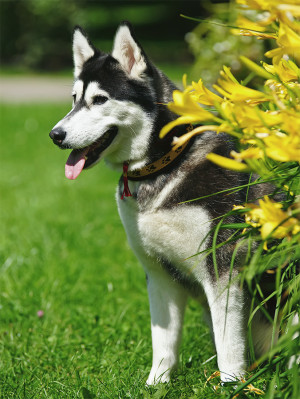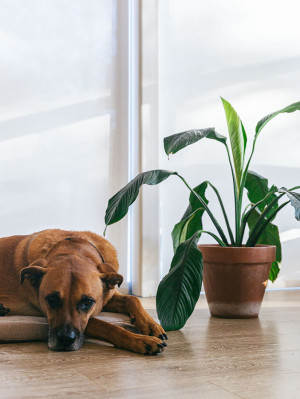Are Spider Plants Toxic to Dogs? Find Out If This Plant Is Safe
They’re cute for home decor, but what about for your dog?
In This Article:
Overview of Spider Plants Are Spider Plants Toxic to Dogs? Basic List of Toxic and Non-Toxic Plants for Dogs
Many people love a houseplant. They add a touch of nature, beauty, and personality to our homes, especially when landlords won’t let us paint. Spider plants are popular choices because of their arching leaves and attractive appeal. That’s fine if you live in a home without pets.
But if you have a pet, you must know whether any plant you add to your home is safe. Spider plants are very visually appealing, and thankfully, no, they are not toxic to your dog.
Snap a pic of your pup’s teeth, and GREENIES™ will help you spot potential signs of oral health issues.
Overview of spider plants
Spider plants (Chlorophytum comosum) are very enticing because they are pretty and easy to care for. They can live in various conditions, thrive in indirect sunlight, and need very little watering. That makes them perfect for a busy household.
How much do you spend on your pet per year?
Native to South Africa, these robust but visually appealing plants, with their ribbon-like foliage, also purify the air. You will most often see them in hanging pots, higher shelves, or office areas.
Spider plants have an interesting method of propagation. They produce “spiderettes,” little offshoots that can become new plants.
Are spider plants toxic to dogs?
Per the American Society for the Prevention of Cruelty to Animalsopens in new tab (ASPCA), the good news is that spider plants are not toxic to your pup. But the consumption of any plant material may cause vomiting and gastrointestinal upset in pets. The ASPCA advises pet parents contact their veterinarian or call the ASPCA Animal Poison Control Center opens in new tab immediately if they suspect their pet has been exposed to any poisonous substances or potentially toxic plants.
What happens if my dog eats a spider plant?
If your pup nibbles on a spider plant, it will not likely lead to serious problems. However, watch for these possible side effects:
If your dog ingests a large amount of the plant, it may lead to mild vomiting or diarrhea.
Spider plants have long leaves and can present a choking risk, particularly for little dogs.
If your dog experiences significant symptoms or if you are unsure about the amount ingested, consult your veterinarian for guidance.
Basic list of toxic and non-toxic plants for dogs
Homeowners who like plants in their environment must do their research to find out what is safe for their dogs. Here is a short list of non-toxic and toxic plants to get you started. These lists are not exhaustive. There are many more.
Non-toxic plants for dogs
Spider plant (Chlorophytum comosum)
Areca palm (Dypsis lutescens)
Parlor palm (Chamaedorea elegans)
Calathea (Calathea spp.)
Boston fern (Nephrolepis exaltata)
Baby’s tears (Soleirolia soleirolii)
Bamboo (Bambusoideae)
Toxic plants for dogs
Sago palm (Cycas revoluta)
Oleander (Nerium oleander)
Aloe vera (Aloe barbadensis miller)
Philodendron (Philodendron spp.)
Pothos (Epipremnum aureum)
Peace lily (Spathiphyllum spp.)
Snake plant (Sansevieria trifasciata)
While the above lists are not complete, they highlight some of the most common plants found in homes. Always research the safety of any plant before bringing it into your and your pet’s home.
Bottom line
If precautions are taken to prevent your dog from nibbling on it, a spider plant can be a great choice for introducing a bit of nature into your home. If you do your research, you can have attractive and pet-friendly houseplants in your house. If you’re unsure about a particular plant, consult your vet or a reliable plant database.
References
Bertero, Alessia, et al. “Plants and Zootoxins: Toxico-Epidemiological Investigation in Domestic Animals.” Toxicon, vol. 196, 1 June 2021, pp. 25–31, https://doi.org/10.1016/j.toxicon.2021.03.019. Accessed 7 Nov. 2023opens in new tab.
Cortinovis, Cristina, and Francesca Caloni. “Epidemiology of Intoxication of Domestic Animals by Plants in Europe.” The Veterinary Journal, vol. 197, no. 2, Aug. 2013, pp. 163–168, https://doi.org/10.1016/j.tvjl.2013.03.007opens in new tab.
“Toxic and Non-Toxic Plant List - Dogs.” ASPCA, 2015, www.aspca.org/pet-care/animal-poison-control/dogs-plant-listopens in new tab.











